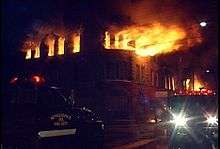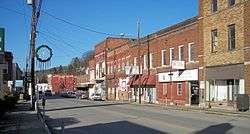Salem, West Virginia
| Salem, West Virginia | |
|---|---|
| City | |
|
Main Street in Salem in 2006 | |
|
Location of Salem, West Virginia | |
| Coordinates: 39°17′0″N 80°33′46″W / 39.28333°N 80.56278°WCoordinates: 39°17′0″N 80°33′46″W / 39.28333°N 80.56278°W | |
| Country | United States |
| State | West Virginia |
| County | Harrison |
| Area[1] | |
| • Total | 1.34 sq mi (3.47 km2) |
| • Land | 1.34 sq mi (3.47 km2) |
| • Water | 0 sq mi (0 km2) |
| Elevation | 1,050 ft (320 m) |
| Population (2010)[2] | |
| • Total | 1,586 |
| • Estimate (2012[3]) | 1,574 |
| • Density | 1,183.6/sq mi (457.0/km2) |
| Time zone | Eastern (EST) (UTC-5) |
| • Summer (DST) | EDT (UTC-4) |
| ZIP code | 26426 |
| Area code(s) | 304 |
| FIPS code | 54-71380[4] |
| GNIS feature ID | 1546280[5] |
Salem is a city in Harrison County, West Virginia, USA. The population was 1,586 at the 2010 census. It is located at the junction of U.S. Route 50 and West Virginia Route 23; the North Bend Rail Trail passes through the city.[6] Salem International University is located in Salem.
Geography
Salem is located at 39°17′0″N 80°33′46″W / 39.28333°N 80.56278°W (39.283411, -80.562731),[7] along Salem Fork, a tributary of Tenmile Creek.,[6] in western Harrison County
According to the United States Census Bureau, the city has a total area of 1.34 square miles (3.47 km2), all of it land.[1]
History

Salem was settled in the summer of 1790 — as "New Salem" — by forty Seventh Day Baptist families from Shrewsbury, New Jersey. It was formally chartered by the Virginia Assembly in 1794. Notable settler family names included Lippincott, Maxson, Babcock, Plumer, Davis, and Randolph.
By the 1870s, the town was more frequently being called "Salem" than "New Salem", as the separation of West Virginia from Virginia in 1863 had diminished the need to distinguish it from the town named Salem near Roanoke. The US Postal Service made the change official in 1884.
Salem was incorporated by the state of West Virginia on 25 February 1905.
Salem has a history of large fires. The same full city block has burned down twice in the city's history. The north side of Main Street downtown burned once in 1901 and again on March 2, 2006. The more recent fire burned the old city bank building, several store fronts, and several residences; five structures in all were damaged. The fire was determined to have been started by a hot water tank in an apartment. The fire departments' ability to put out the blaze was hampered by a limited city water supply; they were forced to draw water from the nearby creek.[8]
The Salem College Administration Building and Salem Historic District are listed on the National Register of Historic Places.[9]
Demographics
| Historical population | |||
|---|---|---|---|
| Census | Pop. | %± | |
| 1880 | 248 | — | |
| 1890 | 310 | 25.0% | |
| 1900 | 746 | 140.6% | |
| 1910 | 2,169 | 190.8% | |
| 1920 | 2,920 | 34.6% | |
| 1930 | 2,943 | 0.8% | |
| 1940 | 2,571 | −12.6% | |
| 1950 | 2,578 | 0.3% | |
| 1960 | 2,366 | −8.2% | |
| 1970 | 2,597 | 9.8% | |
| 1980 | 2,706 | 4.2% | |
| 1990 | 2,063 | −23.8% | |
| 2000 | 2,006 | −2.8% | |
| 2010 | 1,586 | −20.9% | |
| Est. 2015 | 1,551 | [10] | −2.2% |
2010 census
As of the census[2] of 2010, there were 1,586 people, 662 households, and 384 families residing in the city. The population density was 1,183.6 inhabitants per square mile (457.0/km2). There were 834 housing units at an average density of 622.4 per square mile (240.3/km2). The racial makeup of the city was 93.5% White, 4.1% African American, 0.2% Native American, 0.1% Asian, 0.1% from other races, and 2.0% from two or more races. Hispanic or Latino of any race were 1.1% of the population.
There were 662 households of which 27.2% had children under the age of 18 living with them, 36.4% were married couples living together, 15.3% had a female householder with no husband present, 6.3% had a male householder with no wife present, and 42.0% were non-families. 35.3% of all households were made up of individuals and 13.6% had someone living alone who was 65 years of age or older. The average household size was 2.23 and the average family size was 2.88.
The median age in the city was 36.1 years. 20.5% of residents were under the age of 18; 15.8% were between the ages of 18 and 24; 23.1% were from 25 to 44; 26.3% were from 45 to 64; and 14.4% were 65 years of age or older. The gender makeup of the city was 49.1% male and 50.9% female.
2000 census
As of the census[4] of 2000, there were 2,006 people, 744 households, and 412 families residing in the city. The population density was 1,451.0 people per square mile (561.2/km²). There were 858 housing units at an average density of 620.6 per square mile (240.1/km²). The racial makeup of the city was 87.39% White, 2.34% African American, 0.20% Native American, 7.93% Asian, 0.05% Pacific Islander, 0.75% from other races, and 1.35% from two or more races. Hispanic or Latino of any race were 1.00% of the population.
There were 744 households out of which 26.5% had children under the age of 18 living with them, 37.6% were married couples living together, 14.0% had a female householder with no husband present, and 44.5% were non-families. 36.7% of all households were made up of individuals and 15.9% had someone living alone who was 65 years of age or older. The average household size was 2.21 and the average family size was 2.92.
In the city the population was spread out with 18.3% under the age of 18, 25.2% from 18 to 24, 21.0% from 25 to 44, 18.3% from 45 to 64, and 17.1% who were 65 years of age or older. The median age was 31 years. For every 100 females there were 99.4 males. For every 100 females age 18 and over, there were 105.0 males.
The median income for a household in the city was $16,577, and the median income for a family was $27,688. Males had a median income of $27,031 versus $16,667 for females. The per capita income for the city was $11,188. About 26.7% of families and 34.8% of the population were below the poverty line, including 40.6% of those under age 18 and 14.7% of those age 65 or over.
Notable natives and residents
- Jennings Randolph: US Senator for West Virginia (1958–1985)
- Melvin Mayfield: US Army soldier and a recipient of the US military's highest decoration — the Medal of Honor — for his actions in World War II
References
- 1 2 "US Gazetteer files 2010". United States Census Bureau. Retrieved 2013-01-24.
- 1 2 "American FactFinder". United States Census Bureau. Retrieved 2013-01-24.
- ↑ "Population Estimates". United States Census Bureau. Retrieved 2013-06-26.
- 1 2 "American FactFinder". United States Census Bureau. Retrieved 2008-01-31.
- ↑ "US Board on Geographic Names". United States Geological Survey. 2007-10-25. Retrieved 2008-01-31.
- 1 2 DeLorme (1997). West Virginia Atlas & Gazetteer. Yarmouth, Maine: DeLorme. p.24. ISBN 0-89933-246-3.
- ↑ "US Gazetteer files: 2010, 2000, and 1990". United States Census Bureau. 2011-02-12. Retrieved 2011-04-23.
- ↑ WOWK-TV
- ↑ National Park Service (2010-07-09). "National Register Information System". National Register of Historic Places. National Park Service.
- ↑ "Annual Estimates of the Resident Population for Incorporated Places: April 1, 2010 to July 1, 2015". Retrieved July 2, 2016.
- ↑ "Census of Population and Housing". Census.gov. Retrieved June 4, 2015.

